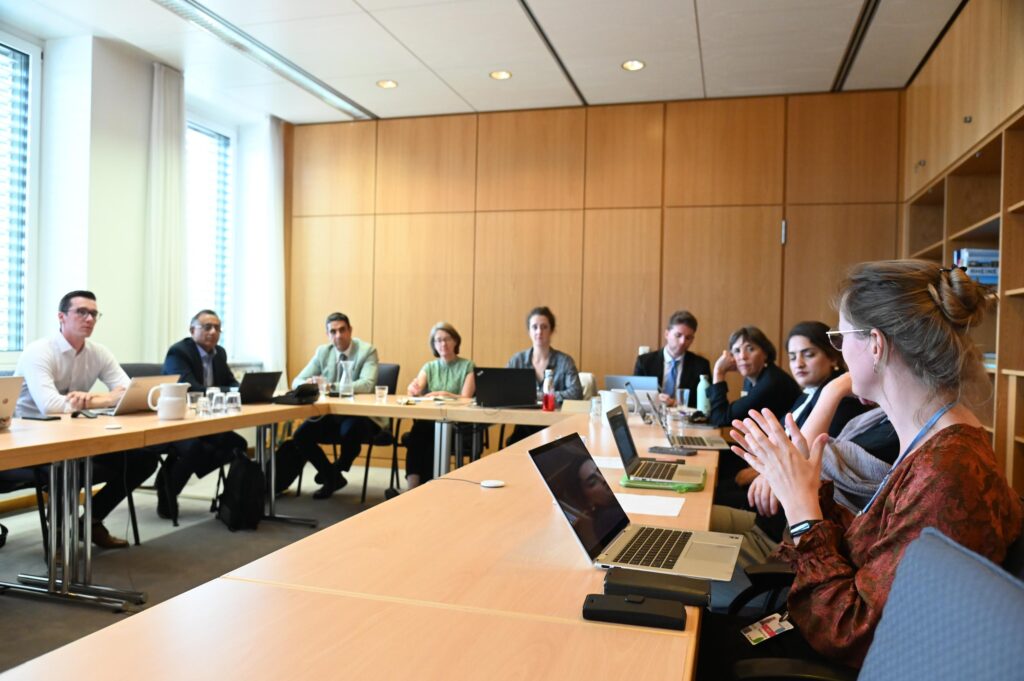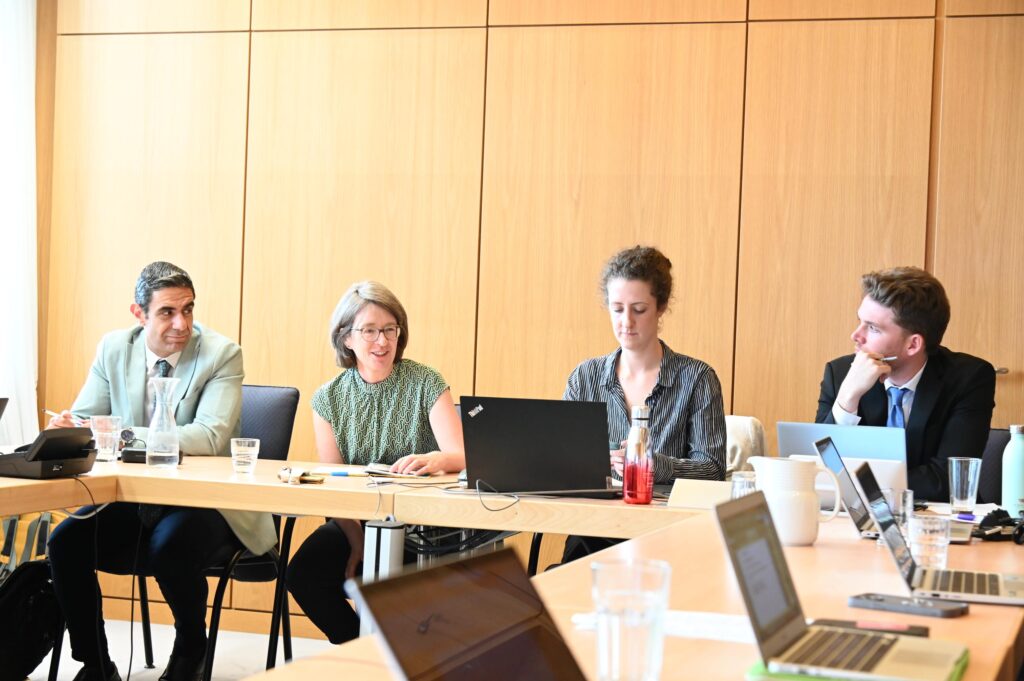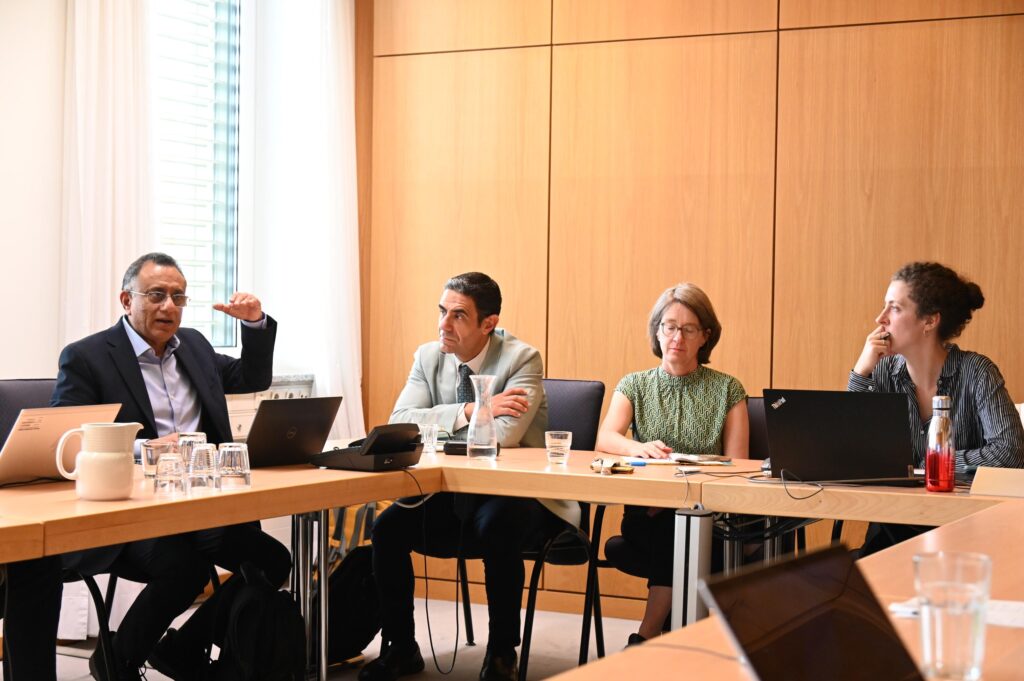
On 24 June 2025, ENACT partners came together in Bonn and online to take stock of progress, align priorities for the road to COP30, and explore how collaboration can accelerate the uptake of Nature-based Solutions (NbS) worldwide. The meeting, co-hosted by the ENACT Co-Chairs — Egypt’s Ministry of Environment, Germany’s Federal Ministry for the Environment, Climate Action, Nature Conservation and Nuclear Safety, and IUCN — brought together government representatives, global institutions, and observers to discuss policy alignment, financing, strategic engagement, and implementation pathways across the Rio Conventions.
Reflecting on Progress and Momentum
Opening remarks from Germany reaffirmed the government’s continued commitment to ENACT under its new administration. Egypt traced the partnership’s evolution and its ambition to serve as a global movement that catalyses NbS action at scale.
The Secretariat presented updates on ENACT’s growing influence, including contributions from partners to key knowledge products, engagement in high-level political events such as COP28’s Joint Statement on Climate, Nature and People, COP29 Nature and Biodiversity Day Ministerial events, and COP16 High-Level Ministerial support to the nature-climate agenda, and the publication of flagship reports. These include the State of ENACT NbS Goals Report, the ENACT 2024 NbS Discussion Paper, and the COP28 ENACT Highlights— all of which have advanced global recognition of the role of nature in climate action.
Since 2023, ENACT has grown to include 22 state and non-state actors from across all continents. In 2025 alone, notable milestones include the launch of a refreshed work plan, a new communications strategy and website, and the initiation of a pilot methodology to track progress on NbS.

Partner Perspectives: Progress, Priorities, and Collaboration
A rich exchange of updates showcased the breadth of NbS work under way around the world. Switzerland reported on its current policies, including an integral forest and wood strategy, a Biodiversity Action Plan for 2025–2030 and resilience indicators. Adapt+ seed funding is helping scale NbS nationally, while adaptation actions focus on forest management, fire prevention, pest control, and building resilient landscapes. Switzerland’s priorities for COP30 include aligning national trajectories with global targets and highlighting the links between forests, nature, and human wellbeing. An opportunity for cooperation with Germany under the Alpine Convention Presidency was also noted.
The United Nations World Environment Programme (UNEP) and its World Conservation Monitoring Centre (WCMC) shared the revival of the World Adaptation Science Programme (WASP) to boost adaptation science, exploration of NbS links with financing mechanisms like the Global EbA Fund and the Adaptation Fund, and capacity-building efforts including e-learning and policy guidance. They are also developing the Convention on Biological Diversity (CBD) voluntary guidelines on ecosystem-based adaptation (EbA) and disaster risk reduction, and are keen to increase private sector engagement and prepare for the Adaptation Futures Conference in October 2025.
Spain reported that it is integrating NbS into restoration policies. Canada is applying NbS to domestic emissions and adaptation strategies while supporting international financing efforts through mechanisms such as the Global Environment Facility (GEF) and the Green Climate Fund (GCF). It is also advancing ocean resilience through the Ocean Risk and Resilience Action Alliance (ORRAA) and supporting CBD funding for NbS-related social safeguards under its G7 Presidency.
Keidanren, Japan’s business federation, emphasised the importance of NbS in urban development, particularly in relation to urban resilience and disaster risk reduction. A dedicated research group at Japan’s Ministry of the Environment is working on linking NbS to economic value.
The European Union (EU) updated participants on developments under the EU Green Deal, Horizon Europe’s Biodiversity+ initiative, adaptation actions, and the New European Bauhaus initiative. The Netherlands is implementing NbS in forest and landscape restoration, continuing a 10-year knowledge and innovation programme, and working on a global NbS opportunity map.
The Climate High-Level Champions shared that the COP30 Presidency is developing thematic axes to coordinate existing initiatives. So far, over 400 initiatives have been mapped, to identify synergies with other Rio Conventions and shape a robust COP30 agenda.
Germany presented its continued Action Plan for NbS and described how domestic implementation is being carried out through various ministries. The country supports the development of a European NbS hub at IUCN’s Bonn office and highlighted challenges such as the overlap of biodiversity and NbS financing, double counting, a lack of explicit NbS references in European Nationally Determined Contributions (NDCs).
Egypt described how its NDCs and National Biodiversity Strategy & Action Plan (NBSAP) integrate NbS, with major projects such as those in the Nile Delta being supported through GCF funding.

Strengthening ENACT as a Platform for Joint Action
The meeting underscored ENACT’s unique value as a convening platform and a movement for political visibility, knowledge sharing, and strategic collaboration.
Key themes emerged around strengthening high-level political commitment and reaching new sectors. Participants discussed how to leverage COP30 to raise ENACT’s goals profile, including potentially hosting a high-level event or ministerial roundtable. Brazil and Egypt called for engaging finance ministers to position NbS as a central climate solution.
There was strong consensus around the need to expand engagement beyond environment ministries to include water, energy, disaster risk reduction, agriculture, and finance sectors. Representatives from Germany and Egypt noted that cross-ministerial collaboration improves policy uptake and scalability.
Knowledge-sharing and cooperation were also highlighted as priorities. The Netherlands proposed a knowledge-exchange event on best practices and tools, while UNEP emphasised the importance of developing collective high-level policy guidance. Partners were encouraged to identify realistic, joint actions that add value to global NbS conversations.
Concrete actions proposed included drafting an ENACT COP30 Roadmap to outline shared priorities and a high-level ministerial session, holding internal learning sessions chaired by interested partners, and enhancing outreach to ministries beyond the environmental sphere. Improved outreach to new strategic partners, such as COP presidencies, and the development of a communication plan to highlight success stories, NbS momentum and participation in IUCN’s World Conservation Congress (WCC) were also agreed upon.

Measuring Progress with a Purpose
UNEP-WCMC presented a draft NbS Pilot Reporting Framework designed to monitor partnership contributions towards ENACT’s goals. The framework includes headline indicators and optional tags such as NbS type, beneficiaries, and success attribution and is designed to align with Rio Convention reporting processes while avoiding duplication.
Partners appreciated the initiative and offered valuable feedback, particularly around ensuring that reporting remains practical and strategic. There was strong consensus that the framework should enhance ENACT’s ability to tell a compelling story about its impact. A dedicated session will be convened to refine the methodology and shape a shared path forward.
Looking Ahead
The meeting concluded with a commitment to continued collaboration and momentum building, with the core group convening soon to chart the joint course of action.
ENACT continues to serve as a beacon for global cooperation on NbS, offering a platform to build shared ambition, deepen partnerships, and drive action toward a more resilient and nature-positive future.
